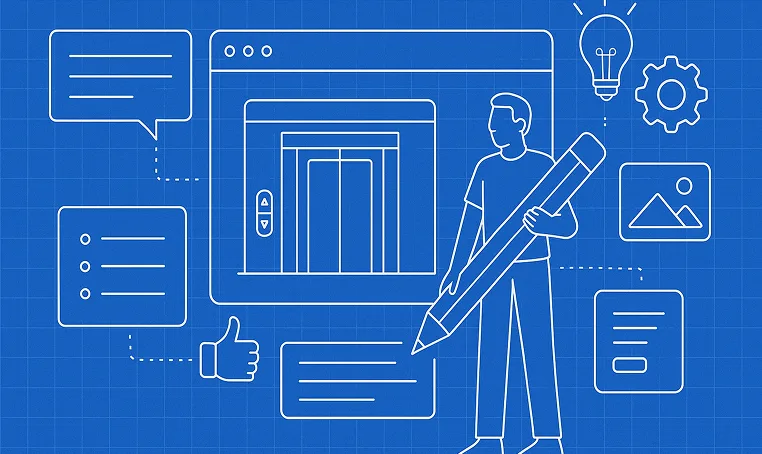Don’t Let An Outdated Website
Hold Back Your Growth
Work With Someone Who Knows Elevator Industry And
Understands How To Build Websites That Generate Results
Avoid These Lead-Killing Website Flaws

Let’s face it. The majority of elevator company websites aren’t saying much. They list some services, mention years of experience, and maybe toss in a generic mission statement.
But none of it actually moves the needle. If you want a website that builds trust and brings in jobs, it’s not enough to just “have content.” You need the right content. Clear, honest messaging that tells people who you are, what you do, and why they should contact you instead of someone else.
The good news? You don’t need to be a professional writer to do it well. You just need to know what matters and how to say it like a human. Let’s break down what great elevator website content actually looks like and how to write it, even if you’ve never written a word of marketing copy in your life.
We’ve said it before: your website is often the first impression someone gets of your company. And that impression usually forms within seconds.
Your design sets the visual tone but your content is what carries the trust. It’s what tells a GC, home owner, property manager, or building owner: “These guys know what they’re doing and they might be exactly who I need.”
If your website just lists a few elevator services and drops a phone number in the footer, it’s probably not converting much. Not because you’re not good at what you do but because you’re not giving the visitor enough reasons to believe it
When your content is dialed in, it answers questions before someone has to ask. It pre-qualifies leads. It reflects professionalism. And it makes it easier for the right kinds of clients to say “yes.”
According to a Stanford study on web credibility, nearly 75% of users make judgments about a company’s credibility based on their website’s content and design. That means what you say, and how you say it; really does impact whether someone trusts you enough to get in touch.
What you write isn’t just about SEO or filling space. It’s about telling your story in a way that builds trust before you ever get on the phone. And that’s something most elevator contractors overlook.
Want to see how content fits into the full structure? Explore how we build elevator websites for conversion

When someone lands on your site, they’re looking for a few simple answers:
The strongest elevator websites answer those questions naturally, not with long-winded pages, but with clear, confident messaging.
That might start with a bold statement on your homepage that says exactly who you serve and what kind of work you do. Maybe it’s, “Modernizing Elevators Across Chicago’s Commercial Market” or “Reliable Residential Elevator Repairs in Southern Florida.” Whatever the case, it should be obvious; no guessing, no scrolling.
Talk about your process. Share the types of projects you’ve handled. Mention the kinds of clients you work best with, whether that’s GCs, property managers, or homeowners. If you’ve got certifications, safety standards, or a great track record, work those in naturally as proof, not as bragging.
If you work in a regulated market or provide ADA-compliant solutions, mention it. These small details can make a big difference in how professionally your company is perceived. Most importantly, your site should guide people toward the next step. That could be booking a consultation, requesting a quote, or just calling your office. Don’t hide it. Make it clear and easy.
One of the biggest problems we see? Elevator websites that sound like they were written by a corporate brochure from 1998.
Phrases like:
That might have worked 20 years ago. But today’s readers tune it out.
If you were explaining what you do to a new client over the phone, how would you say it?
Probably something like:
“We handle elevator installs, cab modernizations, and service contracts across New Jersey. Most of our clients are GCs or property managers looking for a team that shows up on time and gets it done right.”
That’s exactly the kind of tone your website should use. It’s not about being casual, it’s about being clear and confident. And if you’re writing for users on the web, the Nielsen Norman Group points out that most users don’t read every word. They scan. That’s why clarity, formatting, and simplicity matter more than clever phrasing.
Even short testimonials written in a direct tone work better than paragraphs of “marketing speak.” Instead of writing “we strive for customer satisfaction,” share what a client actually said: “They showed up early, finished fast, and handled the inspection like pros.”

Even if someone’s interested in what you offer, they’re not going to read big blocks of text. They’re going to skim.
If your content looks hard to read, it won’t be read. But if it’s clean, direct, and easy to follow; more people will actually stick around long enough to reach out.
Also, don’t forget mobile users. If your content looks cluttered or hard to scan on a phone, you’re going to lose leads. No matter how good the message is. Keep your spacing clean and use headlines that stop thumbs from scrolling past.
Most elevator business owners know what makes their work great. They just don’t know how to put it into words.
The trick? Don’t start with “writing.” Start by answering real questions.
You can even turn those questions into mini-sections for your homepage or service pages. For example, instead of a generic “Our Services” section, reframe it to answer: “What types of jobs do we specialize in and why do clients keep calling us?”
Answer these prompts in your own voice. Record yourself speaking if it helps. Then clean it up slightly for grammar and structure. Don’t try to sound perfect, just sound real.

Writing content for your elevator company website doesn’t have to be complicated but it does have to be intentional.
The words on your site should reflect the quality of your work, the professionalism of your team, and the kind of experience your clients can expect. They should explain who you are, what you do, and why you’re a trustworthy partner; without overexplaining or trying too hard.
Good content builds trust. It reduces friction. It moves someone from “maybe” to “let’s talk.” That’s the job your site should be doing and the words are a big part of that.
Skip the filler. Focus on clarity. And say what you’d actually say to someone face to face. Because in the end, it’s not about sounding clever; it’s about sounding credible.
Templates are fine. But if you want a site that wins jobs — take a look at how we build elevator websites that perform.
Work With Someone Who Knows Elevator Industry And
Understands How To Build Websites That Generate Results